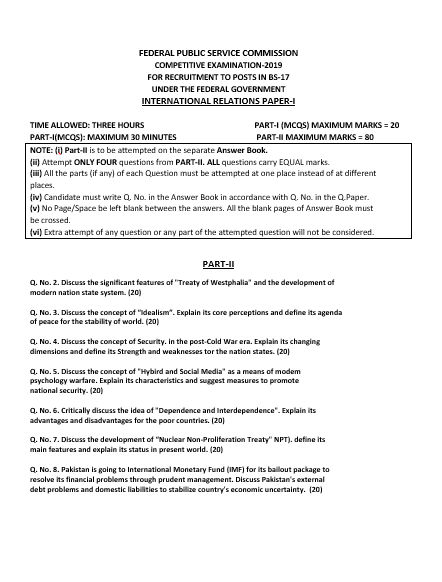CSS International Relations 2019 paper(a)
Q. No. 2. Discuss the significant features of “Treaty of Westphalia” and the development of the modern nation-state system. (20)
Q. No. 3. Discuss the concept of “Idealism”. Explain its core perceptions and define its agenda of peace for the stability of the world. (20)
Q. No. 4. Discuss the concept of Security. in the post-Cold War era. Explain its changing dimensions and define its Strengths and weaknesses to the nation-states. (20)
Q. No. 5. Discuss the concept of “Hybrid and Social Media” as a means of modern psychology warfare. Explain its characteristics and suggest measures to promote national security. (20)
Q. No. 6. Critically discuss the idea of “Dependence and Interdependence”. Explain its advantages and disadvantages for the poor countries. (20)
Q. No. 7. Discuss the development of the “Nuclear Non-Proliferation Treaty” NPT). define its main features and explain its status in the present world. (20)
Q. No. 8. Pakistan is going to the International Monetary Fund (IMF) for its bailout package to resolve its financial problems through prudent management. Discuss Pakistan’s external debt problems and domestic liabilities to stabilize the country’s economic uncertainty. (20)
Summary of Questions:
Q. No. 2. Discuss the significant features of the “Treaty of Westphalia” and the development of the modern nation-state system.
The Treaty of Westphalia (1648) is significant for its role in shaping the modern nation-state system. It ended the Thirty Years’ War in Europe and established the principles of sovereignty, territorial integrity, and non-intervention in the affairs of states. The treaty recognized the independence of states, laying the foundation for the development of the modern international system and the idea of a world order based on independent, sovereign states.
Q. No. 3. Discuss the concept of “Idealism”. Explain its core perceptions and define its agenda of peace for the stability of the world.
Idealism in international relations emphasizes the role of values, ethics, and international cooperation in achieving global peace. Its core perceptions include the belief that human nature is fundamentally good, that international law and organizations can promote peace, and that diplomacy and dialogue are key to resolving conflicts. Idealists advocate for collective security, disarmament, and the promotion of democracy to create a stable world order based on cooperation rather than conflict.
Q. No. 4. Discuss the concept of Security in the post-Cold War era. Explain its changing dimensions and define its strengths and weaknesses for nation-states.
In the post-Cold War era, the concept of security has expanded beyond traditional military threats to include economic, environmental, and human security. The changing dimensions of security involve addressing issues like terrorism, cyber threats, climate change, and human rights. The strengths of this broader approach include greater inclusivity and a focus on global challenges, but its weaknesses lie in the complexity of dealing with non-state actors and transnational issues that can weaken the capacity of nation-states to maintain control and stability.
Q. No. 5. Discuss the concept of “Hybrid and Social Media” as a means of modern psychological warfare. Explain its characteristics and suggest measures to promote national security.
Hybrid warfare combines conventional military tactics with irregular methods like cyberattacks, misinformation, and social media manipulation. Social media has become a tool for psychological warfare, influencing public opinion and political stability. Its characteristics include rapid information dissemination, anonymity, and the ability to spread propaganda. To promote national security, governments can strengthen cybersecurity, regulate social media, improve media literacy, and develop strategies to counteract disinformation.
Q. No. 6. Critically discuss the idea of “Dependence and Interdependence.” Explain its advantages and disadvantages for the poor countries.
Dependence refers to the reliance of developing countries on developed nations for resources, aid, and trade, which can reinforce inequalities. Interdependence, on the other hand, is a mutual reliance where countries benefit from economic, political, and social ties. For poor countries, interdependence can bring benefits such as access to global markets, technology, and investment. However, it can also lead to disadvantages like vulnerability to global economic shifts, exploitation, and the risk of dependency on foreign powers for critical resources.
Q. No. 7. Discuss the development of the “Nuclear Non-Proliferation Treaty” (NPT). Define its main features and explain its status in the present world.
The Nuclear Non-Proliferation Treaty (NPT), established in 1968, aims to prevent the spread of nuclear weapons, promote peaceful nuclear cooperation, and further the goal of disarmament. Its main features include non-proliferation, disarmament, and the peaceful use of nuclear energy. In the present world, the NPT has been successful in limiting the number of nuclear-armed states, but challenges remain with countries like North Korea and Iran, which have violated or rejected the treaty, complicating global non-proliferation efforts.
Q. No. 8. Pakistan is going to the International Monetary Fund (IMF) for its bailout package to resolve its financial problems through prudent management. Discuss Pakistan’s external debt problems and domestic liabilities to stabilize the country’s economic uncertainty.
Pakistan faces significant external debt problems due to borrowing from international lenders like the IMF, which has led to a heavy debt burden. Domestically, the country struggles with high inflation, a large informal economy, and political instability, further complicating economic management. To stabilize its economy, Pakistan needs to implement fiscal reforms, reduce reliance on external loans, improve tax collection, and attract foreign investment while ensuring social stability and economic growth.
